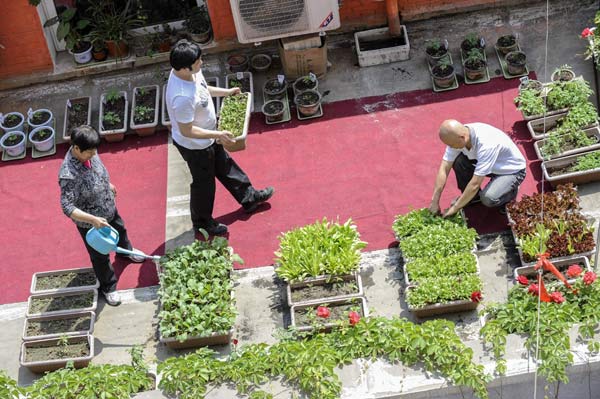Balcony farmers are taking root
Updated: 2012-06-23 10:02
By Zheng Jinran (China Daily)
|
|||||||||||
With growing wealth, concerns about food safety and the fever for online shopping, more urbanites are taking to farming on their own terms. Zheng Jinran reports in Beijing.
 |
|
Beijing residents grow vegetables and plants on their building's roof. Zhang Yu / Xinhua |
The perfect storm of two major trends in China - online shopping and growing concerns about food safety - has given birth to a generation of urban farmers.
More urban residents, many of whom are young people between the ages of 25 to 35 living in metropolises such as Beijing, are growing vegetables and herbs on their balconies or rented farmland in the suburbs, and turning to Taobao, a major online shopping service provider in China, to start their apartment gardens.
Online searches for vegetable seeds at Taobao has increased by 280 percent over the past year, according to the company.
"That means, every day, more than 6,000 people went to online shops at Taobao expecting to buy seeds and tools that can convert their balconies into a small vegetable garden," says Lu Qi, a public relations officer from Taobao.
Xue Ling, 26, has been planting vegetables on the balcony of her apartment in Jinan, capital of Shandong province, since 2010. "It's the only way to keep my food, at least the vegetables, clean and safe," she says.
"Then I found out that many of my friends have realized the importance of eating vegetables. They have been busy planting this year and asked for my help to get tools for them," says Xue, who opened a shop for vegetable seeds in April because of the demand. "The sales in my shop are much higher than I expected. More than 2,000 bags of seeds have been sold since then," she says.
"They plant vegetables not to save money but to guarantee food safety," Lu says.
A number of food scandals have rocked the nation in recent years, including the discovery that cucumbers were found with contraceptives and another incident where leeks were found filled with toxic pesticides. The latest crop to join the list of tainted foods is the Yantai apple, which were found wrapped in paper bags containing chemicals.
Xu Jian, 36, an urban farmer in Hangzhou, Zhejiang province, spent about 1,000 yuan ($158) in seeds and organic fertilizer on farmland he rented. He paid 3,560 yuan to rent the 30-square-meter farmland for two years. But the move did not come without its consequences: His mother moved out of their hometown to help him plant the vegetables.
"Planting vegetables by myself may cost more money than buying them from the market and they might consume extra energy. But the risk of having polluted food is everywhere. I don't want my 3-year-old daughter to suffer from any of it. It is great fun to plant in the farmland and share the spoils with my colleagues," he says, adding that every weekend his family drives to the farmland.
Taobao has taken notice of the demand for vegetables. In addition to selling seeds and tools for urban farmers, the major online shopping provider has begun selling fresh vegetables and other organic food like rice on an independent website called agri.taobao.com as of early June.
"About 1,000 farms and companies want to join and provide their organic products on this new platform," Lu says. "But these green products such as fresh vegetables have special requirement in packaging and transporting, so the sales are not large."
For those urbanites who crave a bigger plot to grow their crops, the website has a bigger plan: Offering farmland for its users to rent. The option should be available in June.
Taobao will soon release rules to regulate land owners and tenants. The website will also soon provide a platform where plots on a farm will be offered for rent.
"But in the initial state, only residents in Hangzhou and Shanghai can enjoy this new service," Lu says, adding that it could possibly expand to cover all cities in China in the near future.
"More cities will see the free and convenient exchange of extra vegetables or other agricultural products," he says. "But there are many problems in achieving this goal, including the packaging and we don't know when it will come to fruition."
Xu's contract for the farmland he rents will end in December.
"I'll still rent some land to plant vegetables, but maybe this time I'll try to do it through the website. I hope it will work to offer me and more people with appropriate land options," he says.
Contact the writer at zhengjinran@chinadaily.com.cn
Today's Top News
President Xi confident in recovery from quake
H7N9 update: 104 cases, 21 deaths
Telecom workers restore links
Coal mine blast kills 18 in Jilin
Intl scholarship puts China on the map
More bird flu patients discharged
Gold loses sheen, but still a safe bet
US 'turns blind eye to human rights'
Hot Topics
Lunar probe , China growth forecasts, Emission rules get tougher, China seen through 'colored lens', International board,
Editor's Picks

|

|

|

|

|

|





